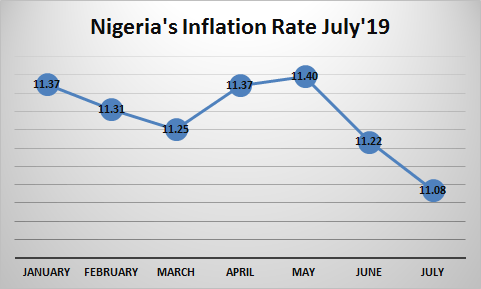Economy
Nigeria’s Inflation Moderates Further in July, Increases 11.08%
- Nigeria’s Inflation Moderates Further in July, Increases 11.08%
The high cost of goods and services are gradually moderating in Africa’s largest economy Nigeria, according to the latest data from Nigeria’s National Bureau of Statistics (NBS).
The Consumer Price Index (CPI), which gauges inflation rate, grew at 11.08 percent in the month of July, a 0.14 percent below 11.22 percent filed in the month of June and slightly higher than the 11.01 percent predicted by analysts at FSDH Research.
On a monthly basis, headline inflation rose by 1.01 percent in July, also 0.06 percent lower than 1.07 recorded in June.
While the composite food gauge rose by 13.39 percent in July, down from 13.56 percent in achieved in the month of June.
The bureau attributed the increase to the rise in prices of Oils and fats, Meat, Bread and cereals, Potatoes, yam and other tubers, and Fish during the month.
On a monthly basis, the index grew by 1.26 percent, down by 0.10 percent from 1.36 percent recorded in June.
“The average annual rate of change of the Food sub-index for the twelve-month period ending July 2019 over the previous twelve-month average was 13.46 13.42 percent, 0.04 percent points from the average annual rate of change recorded in June 2019 (13.42) percent,” the reported stated.
 The inflation rate has now moderated for a second consecutive month after rising to 11.40 percent in the month of May.
The inflation rate has now moderated for a second consecutive month after rising to 11.40 percent in the month of May.
This is another evidence that central bank continuous effort at ensuring dollar liquidity at various segments of the foreign exchange market remains the key to sustaining economic activities and Naira stability.
However, with the foreign reserves gradually declining amid falling global oil prices, the central bank may need to look inward to sustain its function going forward.